As we continue our series on Covenants, in this article we will be looking at God’s Covenant with Noah. What is this covenant and what are the provisions included in it?
Genesis 9:8-11 constitutes what theologians call the “Noahic Covenant.” This is the third or universal covenant and it is the first of God’s arrangements with humanity that He identified as a covenant (Genesis 9:9, 11-13, 15-17) because of its solemn promise to never destroy the earth and life again with a flood.
The Story of Noah and the Great Flood
For many, the account of Noah and the ark is merely an attractively unusual children’s story about an odd man who built a massive boat. Upon the ark’s completion, representatives from every species of the animal kingdom were drawn to Noah, and two-by-two he escorted them onto his untested vessel.
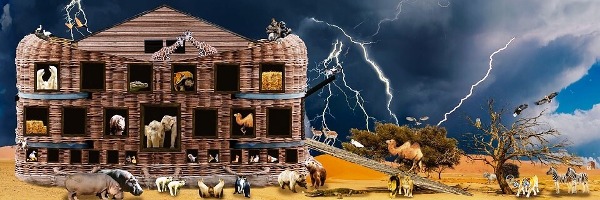
Soon it started to rain and this floating menagerie survived a great flood. After all was said and done, the happy cast of characters got to enjoy a spectacular rainbow before going their separate ways.
In short, the story is often seen as little more than a delightful decorating scheme – cute pictures of Noah and the ark, place mats, and the ark-shaped cookie jars. Tragically, the timeless truths of this story often get lost among the trinkets that decorate our homes.
The Noahic Covenant Explained
Noah had just passed through the awful flood, and he and his wife, his three sons, and their wives – eight people – constituted the world’s population. Noah must have wondered whether his family and the animals from the ark could survive on an empty earth.
So God made a covenant with Noah to assure him that they would endure. Some of the terms of this covenant actually hark back to the original arrangement God made with Adam and Eve when they were the only people and sin had not yet entered the scene.
A second aspect of this covenant adapts the Edenic covenant to a world in which sin, violence, and death are terrible realities (Genesis 9:2-6). And finally, the promise of God’s Covenant with Noah addresses the terrifying prospect of another worldwide flood (Genesis 9:8-17).
At that point, Noah might have thought that the things provided by the covenant with Adam had been changed.
However, God gives the Noahic Covenant so that Noah and all the human race to follow might know that the provisions made in the Adamic Covenant remain in effect with one notable addition: the principle of human government which includes the responsibility of suppressing the outbreak of sin and violence, so that it will not be necessary to destroy the earth again by a flood.
Provisions of God’s Covenant with Noah
1) The responsibility to populate the earth is affirmed.
When Noah came out of the boat, he was like a “second Adam” about to usher in a new beginning on earth for the human race. Faith in the Lord had saved Noah and his household from the destruction, and his three sons would repopulate the whole earth (Genesis 9:18).
God had told Adam and Eve “to be fruitful and multiply … fill the earth” (Genesis 1:28), and He repeated that mandate twice to Noah and his family (Genesis 9:1, 7).
2) The subjection of the animal kingdom is reaffirmed.
Noah may have feared that the wild animals from the ark would prove a threat to the safety of his family. But the covenant assured that the wild animals of every type would fear and avoid humans (Genesis 9:2).
As another remnant of the original Edenic covenant, God promised Noah and his descendants that they would still exercise dominion over the birds, animals, and fish of creation.
3) Man is permitted to eat the flesh of animals but refrain from eating blood.
By the terms of the Edenic covenant, human diet had been vegetarian (Genesis 1:29; 2:16). God’s covenant with Noah introduced meat to that diet (Genesis 9:3). In some way, this reflects further alienation within God’s creation after the Fall as animals now live in terror of humans who may kill and eat them.
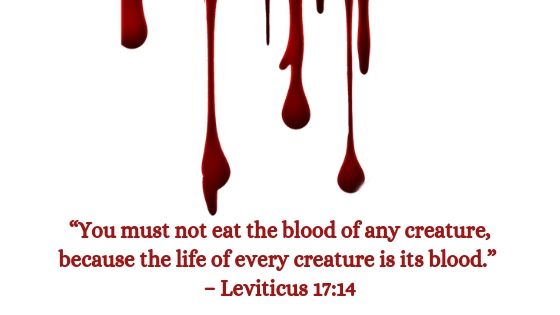
However, God put one restriction on the eating of animal flesh: The meat must be free of blood (Genesis 9:4). Even though people may eat animals; they must respect the principle of life represented by the blood of the animals.
The life is in the blood, and the life must be respected, even if you’re butchering an animal to eat at a feast (See Leviticus 3:17; 7:26-27; 17:10-14; Deuteronomy 12:16; 15:23).
4) The sacredness of human life is established.
After addressing the sacredness of animal life, the Lord proceeded to discuss an even more important topic: the shedding of human blood. Human blood still holds a higher value as the life symbol of a person bearing the image of God (Genesis 9:5-6).
Those who kill their fellow human beings will have to answer to God for their deeds. To attack a human being is to attack God, and the Lord will bring judgment on the offender. All life is the gift of God, and to take away life means to take the place of God. The Lord gives life and He alone has the right to authorize taking it away (Job 1:21).
Violence had been a primary cause of the flood (Genesis 6:11), and God introduced the principle of capital punishment as a deterrent to the repetition of such wholesale bloodshed.
5) The covenant is confirmed to Noah, all mankind, and every living creature on the face of the earth.
Though God spoke especially to Noah and his sons, the Noahic covenant includes all of Noah’s descendants and all generations to come (Genesis 9:9-10). The covenant doesn’t stop there, however, for it also includes every living creature (Genesis 9:10, 12, 15).
Humans, birds, beasts and wild animals, are encompassed in this wonderful covenant – a covenant with creation. At least four times in this covenant, the Lord mentioned “every living creature.” He was speaking about the animals and birds that Noah had kept safe in the boat during the flood.
6) God promised never to destroy the earth again by a universal flood and designated the rainbow as His testimony to this covenant.
In the same way that God helped Abraham remember His covenant with a visible sign – the sign of circumcision (Genesis 17:11; Romans 4:9-12) and Moses (the Mosaic Covenant at Sinai) with the sign of the weekly Sabbath (Exodus 31:16-17), God’s covenant with Noah was sealed with the sign of the rainbow (Genesis 9:12-17).
Whenever people saw the rainbow, they would remember God’s promise that no future storm would ever become a worldwide flood that would destroy humanity. It’s noteworthy that the New Testament alludes to this promise when it prophesies that God will use fire to destroy the earth at the end of time (2 Peter 3:10).
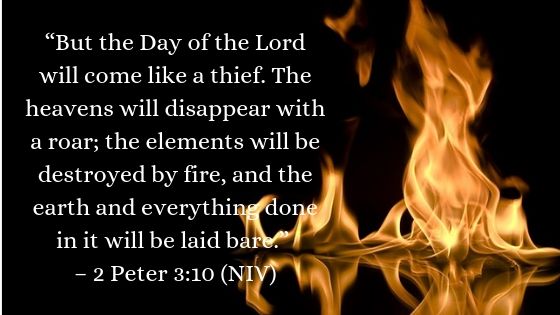
But the rainbow isn’t only for us to see, it’s an assurance that we don’t need to be afraid because certainly, God does not forget his covenants with His people. For the Lord said “the rainbow in the clouds serves as a reminder of My everlasting covenant with every living creature and of all flesh that is on the earth” (Genesis 9:16).
When we look at the rainbow, we know that our Father is also looking at the rainbow, and therefore it becomes a bridge that brings us together.
The Message of the Flood
1) God Grieves and Judges
The story of Noah and the Ark is, first of all, a story about the terrible depravity of men and women. According to the Scripture, human wickedness was rampant on the earth.so much so that the Lord was “sorry” and “grieved” (Genesis 6:6).
Here is a startling aspect of the story of the Flood, a rare glimpse of divine emotion and vulnerability. God our Creator was disappointed and wounded by sin.
The Flood is also a story about God’s judgment. We can’t soften the harsh realities of God’s severe verdict of the wicked people of Noah’s time. God issued His verdict in plain language: “I will destroy man whom I have created from the face of the earth” (Genesis 6:7).
Is this a harsh verdict? Not really. A holy God certainly could not condone sin nor could He tolerate it. It had to be addressed; it had to be punished, for God to remain the God of justice.
When we read the story of Noah, we often forget the terrible loss of life. We tend to focus so much on the boat and the adorable animals, that we forget that great floodwaters beneath it. Below the rails of Noah’s boat were drowning sinners – real people entering a dreadful eternity apart from God.
2) Depravity Meets Grace
Yet the flood is also a reminder of the love and mercy of God. “Noah found grace in the eyes of the Lord” (Genesis 6:8). By electing Noah and his family and saving them from judgment, God demonstrated amazing grace.
Even though humanity deserved the full force of His wrath, God in His mercy provided salvation.
All in all, the story of Noah and the Great Flood is a wonderful precursor of the ultimate salvation God would one day provide in Christ. Long after the floodwaters subsided, the human race would continue in its sinful rebellion. And God would continue to require the just penalty for sin; death.
But the next time, instead of providing an ark, God would provide His own son. By that act, He would open the door of salvation, for not only one family, but for all who would believe in him (John 3:16).
Closing Words
In many ways, God’s Covenant with Noah foreshadowed the New Covenant. The New Covenant also fulfilled much of what the Noahic Covenant anticipated. Looking at it more closely, Jesus Christ shedding His blood at Calvary brought the ninth chapter of Genesis into focus.
Like the Noahic covenant, the New Covenant was initiated by God and was accomplished by Him. What makes it different though is that while all flesh benefited from the common grace of God promised in the Noahic Covenant, only those who are “in Christ” benefit from the blessings of the New Covenant.
What is the New Covenant? It’s the New Covenant “in His blood” that is experienced by those who have trusted in the blood of Christ that was shed for the forgiveness of their sins and as a result, will receive the gift of eternal life.
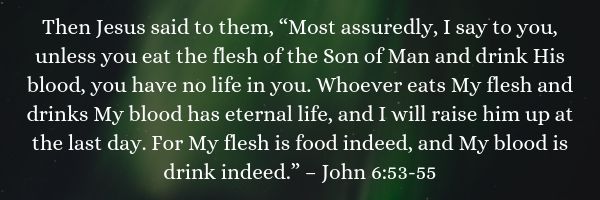
This means acknowledging not only Christ’s deity and the death that He died for sinners but also to make this a vital part of your life by trusting only in Christ for your salvation.
While the Noahic Covenant guaranteed all flesh that God would never again destroy all life by a flood, the New Covenant assures us that we will not face the outpouring of God’s divine wrath through other means, such as fire.
By the way, there is only one condition for entering into the blessing of the New Covenant and that is by acknowledging your sinfulness, repenting of your sins and expressing personal faith in Christ by receiving Him as Lord and Savior of your life (John 1:12).
References:
- NKJV Prophecy Study Bible (John Hagee – General Editor)
- The Transformation Study Bible (Dr. Warren W. Wiersbe – General Editor)

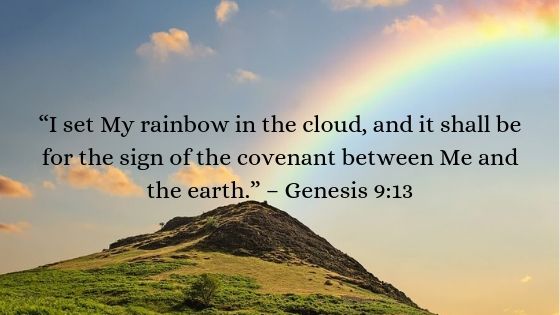
This article has refreshed my understanding on the concept of Noah’s covenant with God and what its revealed in theological research endeavor.
Hi David,
Thank you for your kind comment!
I’m so glad to hear that the article helped refresh your understanding of God’s covenant with Noah. It’s such a foundational moment in Scripture, and seeing how it connects to God’s bigger plan of redemption is truly awe-inspiring.
I also appreciate that you’re approaching it from a theological research perspective—that deeper dive into God’s Word always brings out such rich insight.
May your study continue to be fruitful and full of fresh revelation!
Blessings!